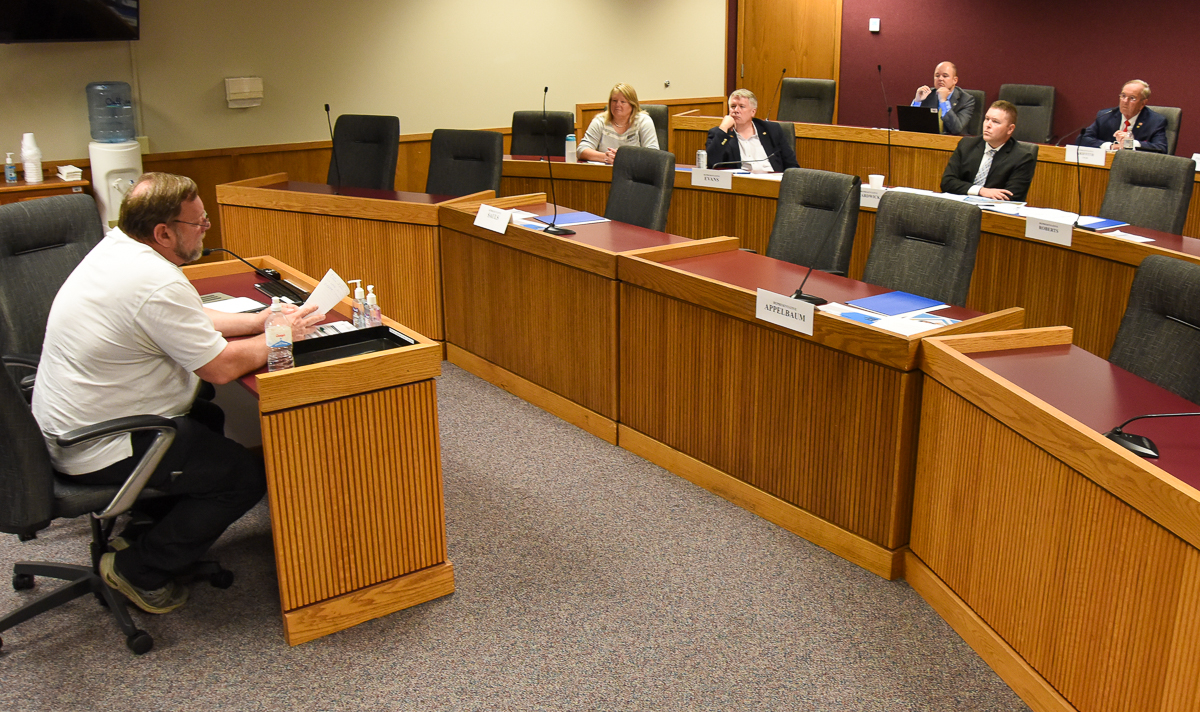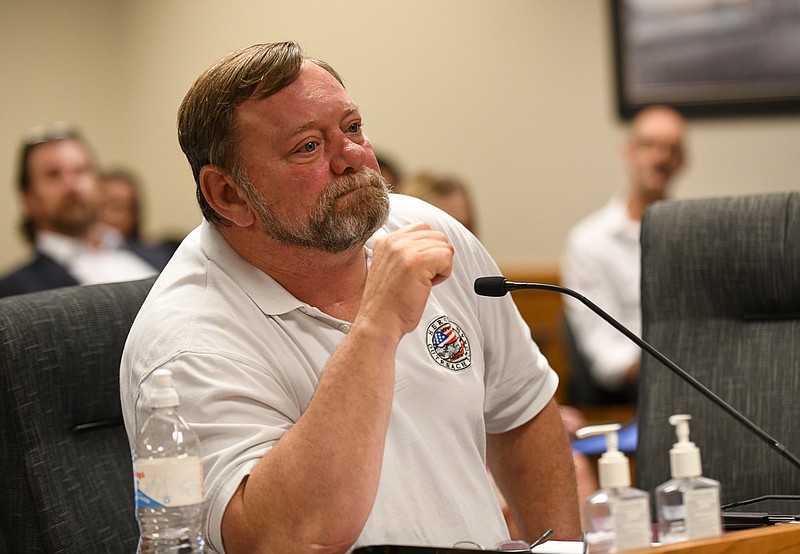A nightmare has haunted John Morlock since he was 20.
He would say he was still a farm boy when he entered military service.
"Now that I'm older and have seen the things I have, I now know that I was only a boy," Morlock told members of the Missouri House of Representatives Interim Committee on Veterans Mental Health and Suicide early Wednesday afternoon.
His voice cracked as he spoke. He asked the committee to forgive him, should he begin to cry.
He was assigned to a combat support hospital. In the summer of 1983, his outfit was deployed to a Honduran battalion aid station to care for military personnel and civilians injured in neighboring El Salvador, where a civil war raged.
U.S. Special Forces were tasked with preventing the war from spilling over into Honduras, he said. To keep the aid station secure, the United States would send out patrols to keep the area cleared of snipers and other threats. His leaders assigned Morlock as a support for some of the patrols.
On one patrol that summer, the soldiers came upon a small village -- little more than a handful of huts, he said.
Salvadoran rebels, he told the committee, would go into the villages and kidnap fighting-age men and boys and force them to fight for them, he said.
"To assure that they had nothing left to go back home to," Morlock said, "they would then kill all of the women and children in the village."
When the patrol came upon this small village, they found the rebels had used machetes to kill all the residents.
As the medic, it was Morlock's responsibility to triage all the residents of the village to see if he could save any, he told the committee through tears as he began to cry. Another soldier approached him and said he found a pregnant Salvadoran girl whom rebels had hacked with their machetes, and had stabbed in the abdomen.
But, the soldier said he thought the abdomen moved.
"In an effort to save at least one of the victims, I then performed a C-section there on the field," he said in a shaken voice. "Of course, the child had already been dead.
"That's a nightmare that has haunted me since I was 20 years old."
Morlock shot himself in the head a year after his release from the Army. Despite dying three times, doctors revived him.
About 20 years later, he founded the Heroes Outreach Program, which aims to prevent veterans from feeling alone and reaching low points in their lives. In the program, veterans may sit down with a friend or peer over a meal or cup of coffee.
It's a simple act that may help prevent suicide.
Stacey Williams, the Missouri Department of Mental Health suicide prevention programs coordinator testified Missouri's suicide rates are consistently higher than national age-adjusted suicide rates and national veteran suicide rates.
In 2019, Missouri recorded 1,130 suicide deaths, 188 of which were veterans (about 17 percent). In 2020, Missouri had 1,125 suicides, she said.
The rate for suicides in Missouri was about 18.3 per 100,000 population. The national rate was ab0ut 14 per 100,000, she said.
U.S. Air Force veteran Kevin Weaver, co-founder of The Warrior's Journey, said his organization raises awareness about (and connects veterans to resources surrounding) invisible wounds that can lead to brokenness, addiction and suicide. He pointed out it is not only veterans who are affected by service. Weaver said children of veterans oftentimes have suicidal thoughts.
He added there are more than 21 million veterans in the states and nearly 480,000 live in Missouri. Veterans are more likely than civilians to abuse alcohol and are twice as likely to overdose on opioids. Weaver said 21 percent of domestic violence reports involve veterans.
The military needs warriors who can carry out the jobs they've been tasked with, he said. They are "mission ready." The government has gotten really good at physical resilience but is failing on the internal side of things, he added.
"They are physically fit, there's no doubt," Weaver said. "But, they come home broken. Broken marriages. Broken families. They come home with moral injuries, certain addictions, isolation, often war trauma. And have no clue where to turn for help."
And, when they do turn to someone for help, they may not get what they seek.
"So, we're failing in the emotional and spiritual side of resilience," he said. "That's what we focus on. We've gotten really good at healing the physical wound in the battle, but often we don't recognize the internal wounds that are so prevalent among our veterans."
The Warrior's Journey exists to heal the emotional wounds, he said. It does so by focusing on prevention and intervention. Prevention includes education of warriors and military leaders about how they might avoid moments of crisis. The group tries to raise awareness of the challenges facing veterans.
It's critical to let people know that before they get to a point of crisis, there are resources and people who may assist.
The Warrior's Journey also works 24 hours a day to provide a crisis intervention process.
The key, Weaver said, is to connect veterans in crisis with someone who's been in their shoes, who can share their own stories about how they navigated the challenges.
"There are a wide challenges that can turn into a moment of crisis. It can be a broken family. It can be an issue at home while someone's downrange. It could be a financial stress, health issues, addictions," Weaver said. "All of that, we believe, leads to areas of suicidal ideations. It's a very complex issue. It's not just one thing. It's many things."
During its inaugural hearing in July, the committee heard other heart-wrenching stories of veteran suicides that devastated families.
Matthew "Matt" Brown's widow Kelly Brown, and daughter, Bailey Blackmann testified in July about Matt Brown's death this past November.
Brown had a 21-year career as a Springfield police officer and served many different roles within the department. He also had served 25 years in the Missouri Army National Guard, rising in its ranks to lieutenant colonel.
His brother, Col. Mike Brown, of the Missouri National Guard, testified Wednesday about his death, and the resources the committee has to draw from to help prevent future deaths.
Mike Brown, who spoke late during Wednesday's hearing, told the committee folks trained in the military may have kinks in their armor, but they hide them.
"They should talk to family friends and others and get help. Because of Matt's decision, I'm getting help," Mike Brown said. "Because of all of you, I hope that vets will go and get help -- and talk to family and friends."
He added the issue is not easily fixed. In Wednesday's testimony alone, he said, listeners heard discussions about faith, medications and therapies. Mike Brown pointed out no fewer than eight organizations testified about the resources they offer.
Additionally, the Army is putting resources in place, he said.
But, it recognizes that more needs to be done.
"Some individuals here today ... are still suffering in silence," he said. "Awareness, vigilance and caring for each other is the right step.
"I pray that my words will encourage people to seek assistance from those around them."
 John Morlock, seated at left, told members of the Missouri Veterans Interim Mental Health Committee on Aug. 31, 2022, that they are looking at a ghost because, after returning from his service in the U.S. Army, he attempted suicide. He said the doctors were better at keeping him alive than he was at dying, so after healing physically, he founded the Heroes Outreach Program for veterans or first responders to get together over coffee or a meal to talk and work through issues. (Julie Smith/News Tribune photo)
John Morlock, seated at left, told members of the Missouri Veterans Interim Mental Health Committee on Aug. 31, 2022, that they are looking at a ghost because, after returning from his service in the U.S. Army, he attempted suicide. He said the doctors were better at keeping him alive than he was at dying, so after healing physically, he founded the Heroes Outreach Program for veterans or first responders to get together over coffee or a meal to talk and work through issues. (Julie Smith/News Tribune photo)
